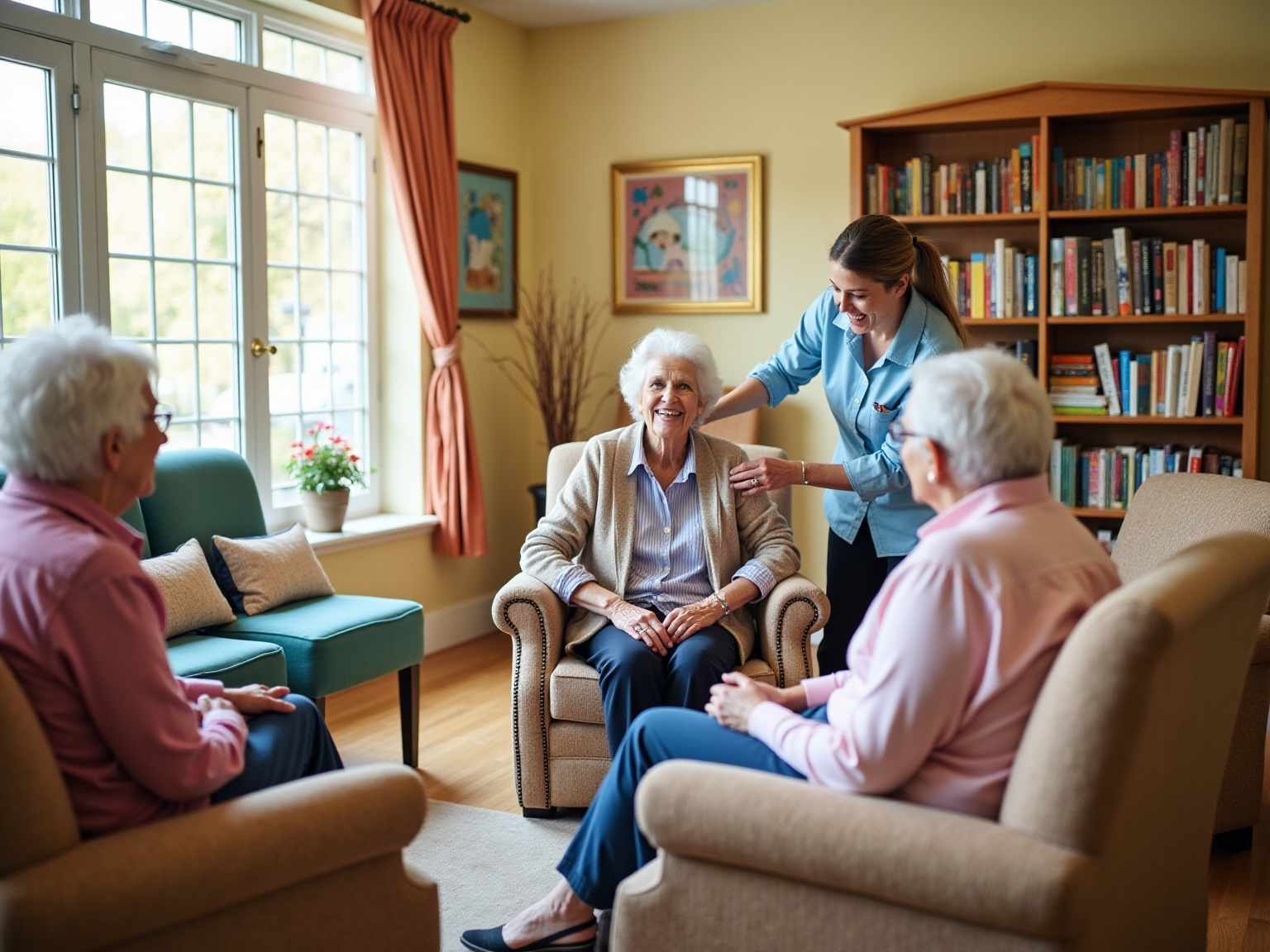Overview
Choosing the right personal care home for your loved one is an important decision that can significantly impact their quality of life. It’s essential to evaluate key factors such as:
- Location
- Services
- Staff qualifications
- Financial considerations
- Resident feedback
By thoughtfully assessing these elements, you can find a facility that truly meets the needs of your family member.
Involving loved ones in this decision-making process is crucial. Their insights and feelings can provide valuable perspectives that enhance your understanding of what is needed. Remember, you are not alone in this journey; we’re here for you every step of the way.
By taking the time to consider these aspects, you can ensure that your relative receives the necessary support and care they deserve. Together, let’s make this important choice with confidence, knowing that it will lead to a better quality of life for those we cherish.
Introduction
In a world where the aging population increasingly seeks supportive living arrangements, personal care homes have emerged as a vital solution for those requiring assistance with daily activities. These facilities offer a unique blend of independence and care, allowing residents to thrive in a nurturing environment that prioritizes their well-being.
As families explore options for their loved ones, understanding the significance of personal care homes becomes crucial. With a focus on personalized care plans, innovative programs, and the importance of professional support, this article delves into the key factors to consider when evaluating these essential living spaces.
From assessing care quality to navigating financial implications, the journey toward finding the right personal care home is both significant and deeply personal. We’re here for you every step of the way, ensuring that your comfort is our priority.
Understand Personal Care Homes: Definition and Purpose
Understanding personal care homes, often referred to as assisted living facilities, highlights their crucial role in providing a nurturing environment for individuals who need assistance with daily living activities but do not require the intensive medical care found in nursing homes. These facilities foster a supportive, home-like atmosphere where residents can receive help with essential tasks such as bathing, dressing, medication management, and meal preparation. The primary goal of personal care homes is to encourage independence while ensuring safety and support for seniors and individuals with disabilities.
Recent trends in 2025 show a growing focus on creating personalized support plans tailored to the unique needs of residents in personal care homes, significantly enhancing their quality of life. Experts emphasize that personal care homes bridge the gap between independent living and nursing facility support, providing a balanced approach to senior assistance. For instance, many personal care homes across the U.S. are embracing innovative programs that promote social engagement and physical activity—both vital for maintaining the well-being of their residents.
Statistics reveal that personal care homes are increasingly favored by numerous households, with over 800,000 occupants in such facilities nationwide. Notably, Best Care Nurses Registry serves clients in cities like Miami, Fort Lauderdale, and Boca Raton, underscoring its commitment to providing personalized support in these communities. The domestic health assistance services offered by Best Care Nurses Registry, including CNA/HHA services, focus on safety, convenience, and emotional support for seniors and their families, ensuring they receive the necessary help while preserving their independence.
Neglecting domestic health services can pose significant risks for seniors, including health deterioration, poor nutrition, sanitation issues, mobility challenges, social isolation, household hazards, and medication mismanagement. These risks highlight the critical need for professional caregivers who provide essential support and monitoring.
Case studies demonstrate that these residences effectively promote independence, allowing seniors to maintain dignity in their daily lives. One notable example is a facility that implemented a personalized support model, resulting in increased resident satisfaction and a marked decrease in the need for emergency medical interventions. This aligns with findings from the case study titled ‘The Advantages of Domestic Assistance for Disabled Adults,’ which illustrates how domestic services enhance dignity and improve the autonomy of disabled adults in their personal care home.
Understanding the purpose and benefits of a personal care home is vital for families exploring support options. These personal care homes not only provide assistance to seniors but also play a pivotal role in enhancing their overall quality of life. As Jessica Turner, a caregiver, points out, the bond established between caregivers and residents is built on trust and compassion—an essential component of successful assisted living. Furthermore, expert perspectives suggest that residential facilities should focus on creating environments that prioritize safety and autonomy, offering a beneficial option for families seeking reliable support for their loved ones.
If you are considering support options for your family members, we invite you to reach out to Best Care Nurses Registry at (888) 203-2529. We are here to assist you in finding the right solution, ensuring your loved ones receive the compassionate care they deserve.
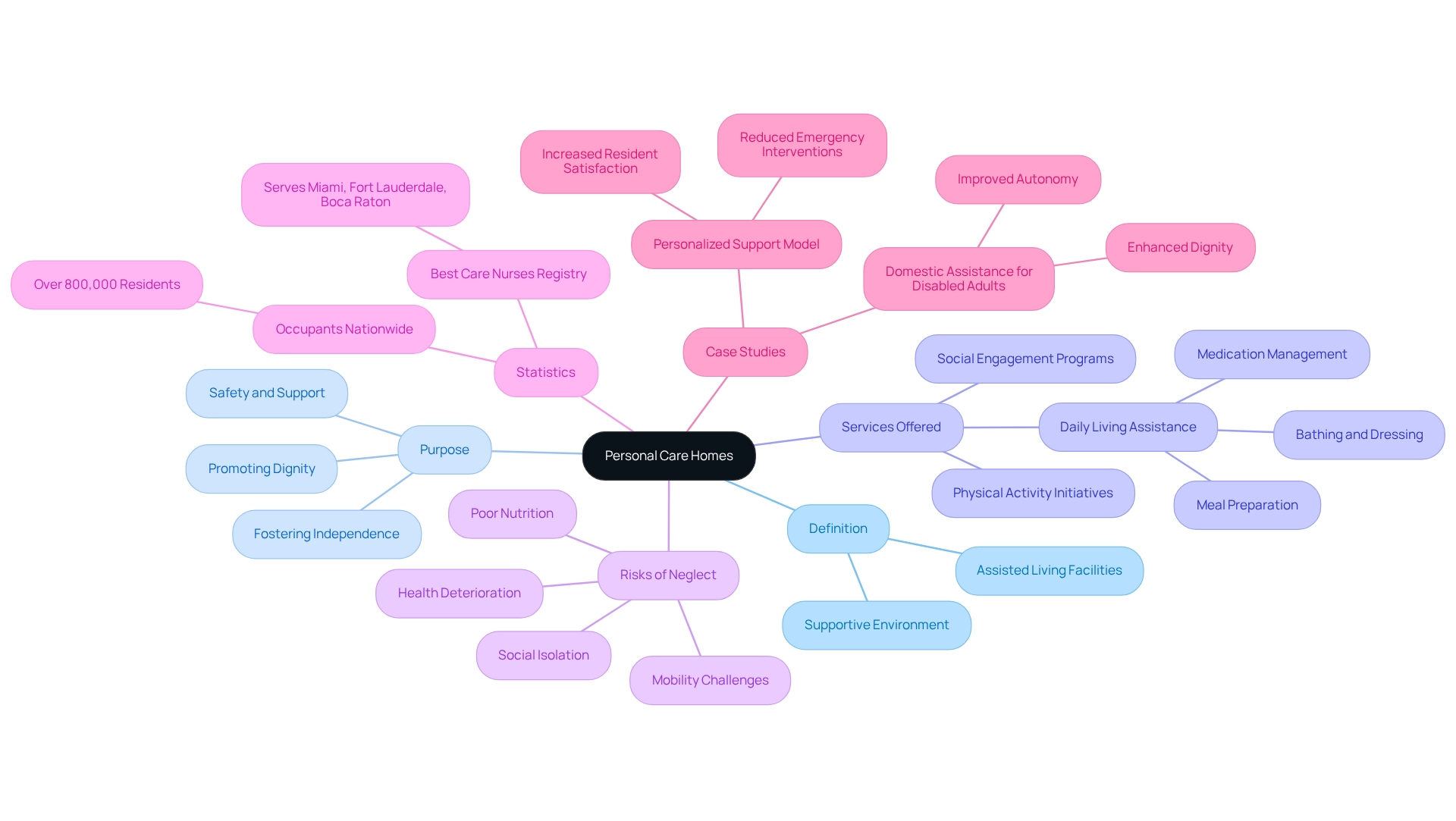
Evaluate Key Factors: Location, Services, and Amenities
When assessing individual support facilities, several key factors should be taken into account to ensure the best match for your loved one. The proximity of a personal care home to relatives and companions plays a crucial role in a resident’s emotional well-being. Homes situated near loved ones or familiar environments can significantly enhance comfort and support. Recent statistics indicate that a majority of families prefer facilities within a short distance from their residences, highlighting the importance of location in the selection process.
Services Offered: Facilities differ significantly in the quality of support they offer. It is crucial to confirm that the selected residence can accommodate your loved one’s particular requirements, whether that involves help with mobility, medication management, or specialized support for conditions like dementia. Consulting with geriatric support specialists can offer valuable perspectives on the essential services that should be accessible in assisted living environments. Furthermore, personal care homes are typically more economical than nursing facilities, making them a financially feasible choice for numerous families. Involving private duty RNs and LPNs from Best Care Nurses Registry can further improve the quality of service, offering compassionate support customized to individual health requirements.
Amenities: The facilities provided by a personal care home can significantly impact the quality of life for residents. Look for facilities that provide a range of recreational activities, diverse dining options, and inviting communal spaces. A vibrant community with engaging activities can foster social interaction and enhance overall well-being. Exploring prospective residences to observe these characteristics directly and asking about their daily routines and activities can offer a clearer understanding of what to anticipate.
Consultation with Family and Professionals: Engaging in discussions with family, friends, and healthcare professionals can offer additional insights and perspectives that are invaluable in the decision-making process. Their experiences and recommendations can guide you toward the best options available. It’s also important to consider the potential risks seniors face without proper caregiver services, such as health decline and social isolation, which can be mitigated by professional caregiving.
Addressing Concerns: If problems occur in a residential facility, it is essential to tackle them proactively. As mentioned by Moran Law, engaging a skilled legal team signifies taking a proactive measure towards tackling and resolving any concerns of elder mistreatment in residential facilities. This advocacy is vital for safeguarding the safety and well-being of your cherished individual.
By thoughtfully evaluating these elements, families can make educated choices that emphasize the comfort and assistance of their relatives in residential facilities, ensuring they obtain the support needed for an improved quality of life.
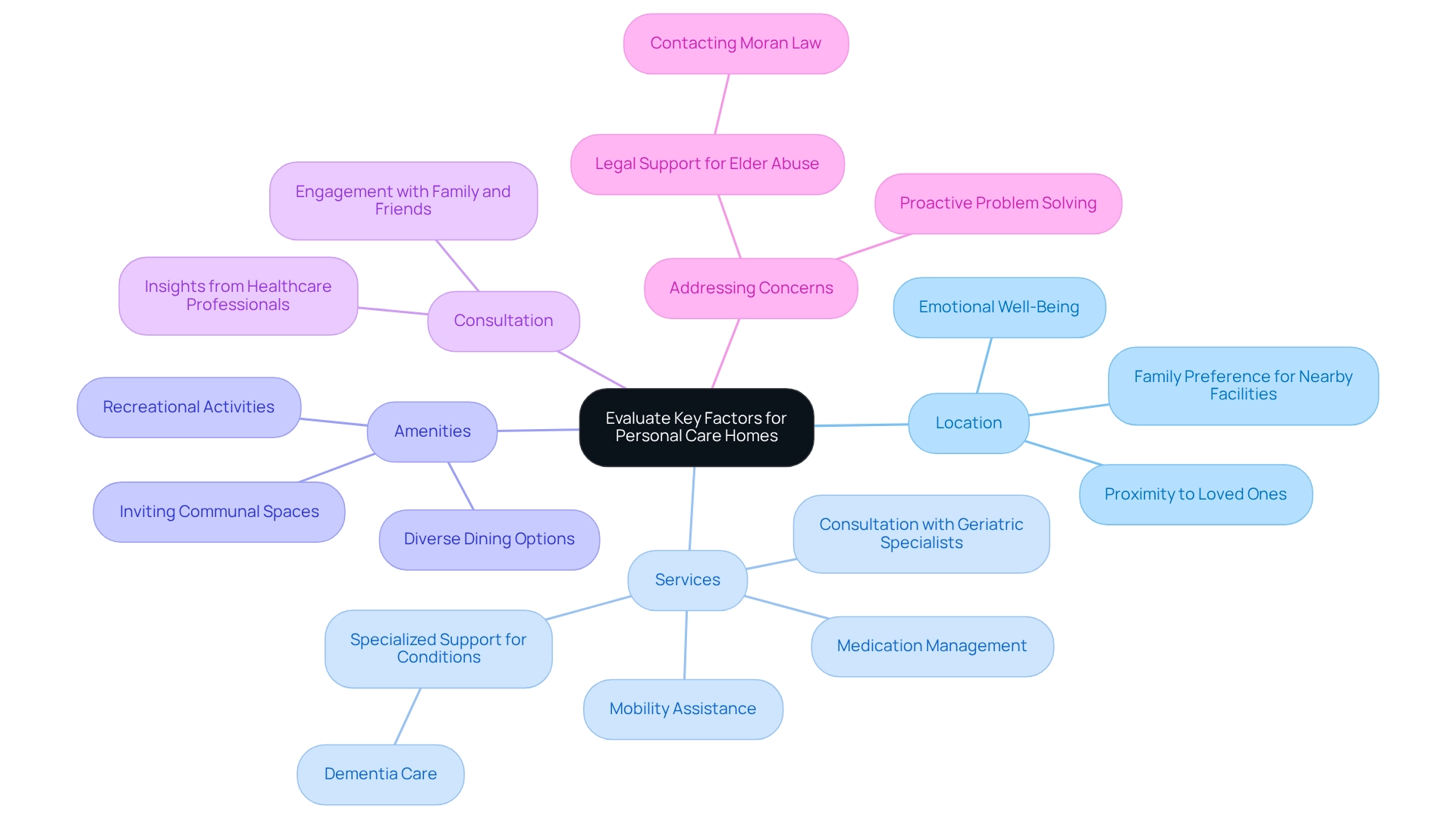
Assess Care Quality: Staff Qualifications and Resident Feedback
To effectively assess the quality of care in a personal care home, it’s important to focus on a few key areas that truly matter to you and your loved ones, starting with the staff qualifications by investigating the training and credentials of the staff members. It’s essential to prioritize residences that employ licensed professionals, such as registered nurses (RNs) and licensed practical nurses (LPNs). Recent statistics indicate that around 70% of personal care homes hire licensed professionals, underscoring the importance of qualified personnel in delivering high-quality assistance. Continuous education in elder support practices is vital for caregivers, ensuring they are well-prepared to meet the evolving needs of residents. Without proper caregiver services, seniors may experience health declines, poor nutrition, and increased risks of accidents, which highlights the necessity of professional care. Additionally, caregivers offer essential emotional support and assist with household management, both of which are crucial for creating a safe and comfortable living environment.
Resident Feedback: Engaging with current residents and their families can provide invaluable insights into their experiences. This direct feedback helps illuminate the facility’s strengths and weaknesses. Online reviews and testimonials can further shed light on the property’s reputation. Pay close attention to comments about staff responsiveness, the cleanliness of the environment, and the overall atmosphere, as these factors significantly impact residents’ quality of life. Case studies have shown that resident feedback can directly influence the standards of personal care homes, leading to improvements in service practices and management. As Marina Renton wisely noted, ‘Do not presume you know best without specialized knowledge of care facilities.’ This highlights the importance of informed decision-making. Furthermore, families can consult comprehensive health inspection documents and grievance inquiries for Medicaid and Medicare-certified nursing facilities to confirm service quality. The presence of professional caregivers not only enhances safety but also provides emotional support, which is vital for maintaining seniors’ mental health. Moreover, caregiver services can be tailored to fit the specific needs and schedules of seniors and their families, offering the flexibility and convenience that you deserve.
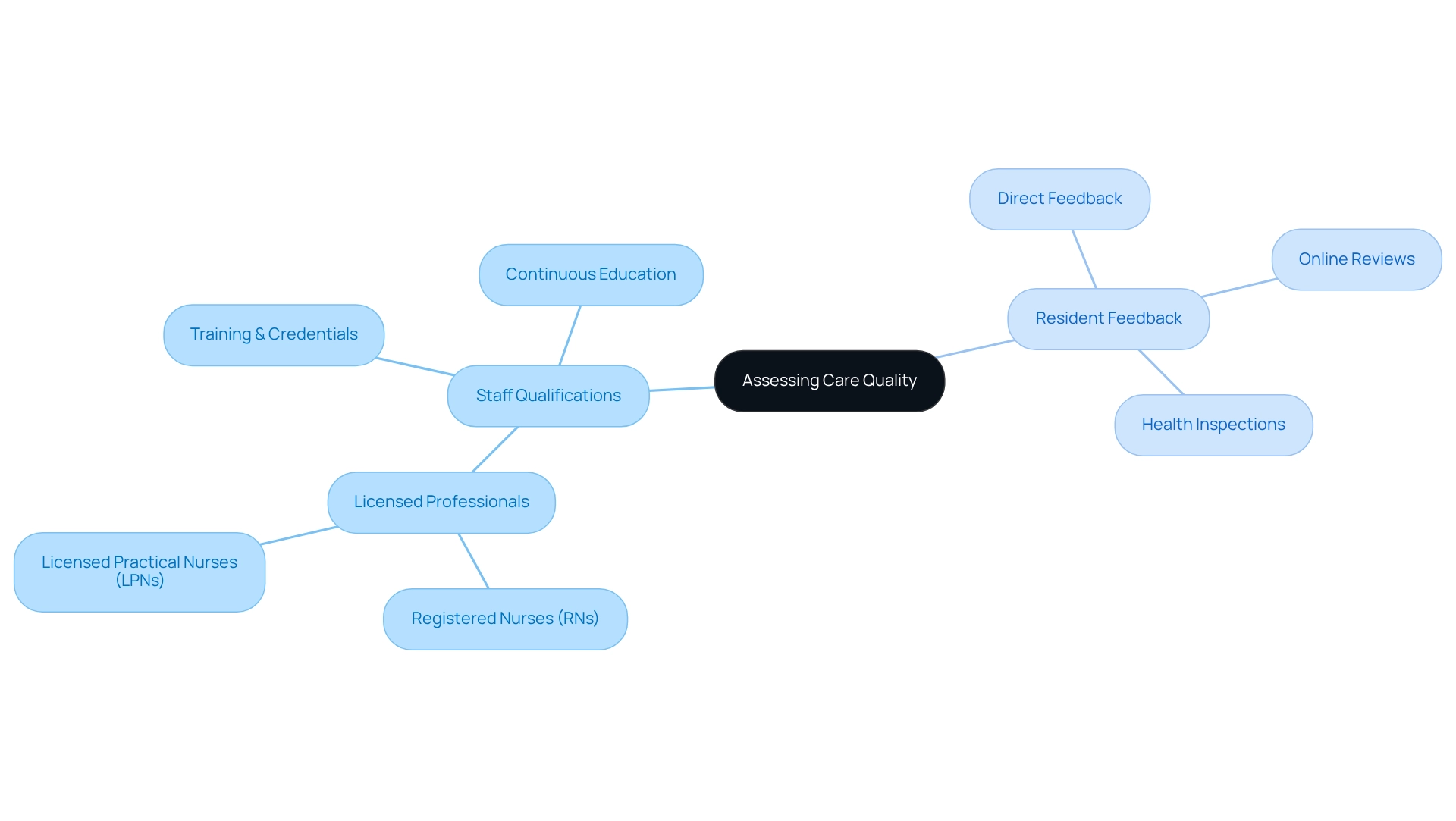
Consider Financial Factors: Costs and Insurance Options
Choosing a personal care home involves careful consideration of financial factors, and we understand how important this decision is for you. Here are some key points to keep in mind:
- Expenses: The charges for a personal care home can vary widely based on location, services offered, and the level of support you need. It’s vital to request a detailed breakdown of costs, including any additional fees for services like medication management or transportation. This transparency can help alleviate concerns about unexpected expenses.
- Insurance Options: Exploring potential funding sources is essential. Consider long-term support insurance, Medicaid, or veterans’ benefits. Understanding what your insurance covers can significantly impact your financial planning. We encourage you to consult with a financial advisor or the facility’s financial office to clarify your options and ensure you maximize the benefits available to you.
Furthermore, the Best Care Concierge Program offers comprehensive support for legal and financial matters. They connect clients with proven experts, including lawyers, guardians, case managers, social workers, financial advisors, and therapists, who can help navigate these complexities. With decades of experience and direct access to a Registered Nurse owner, Best Care stands out in providing tailored support for your needs. Remember, we’re here for you, and your comfort is our priority.
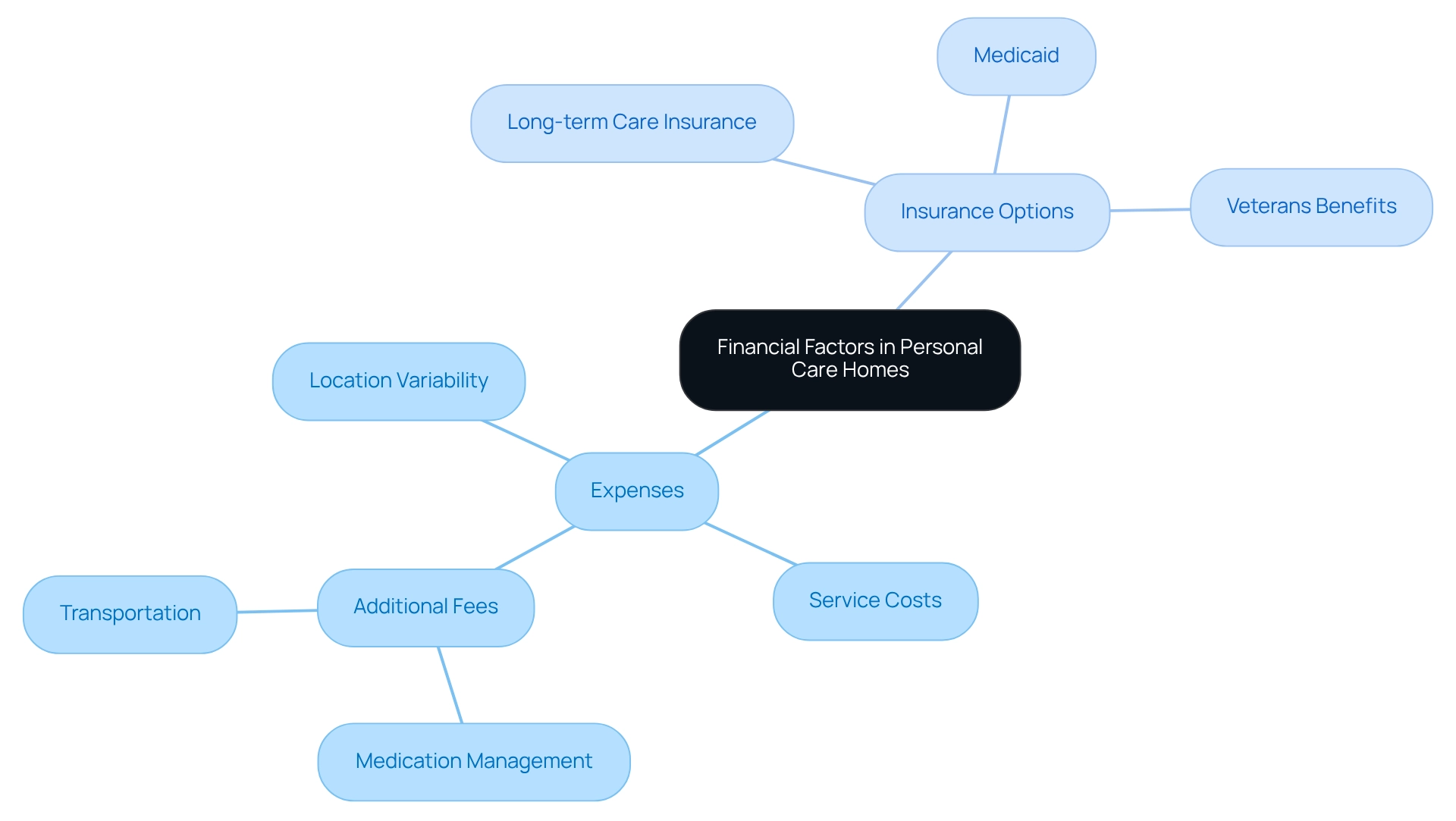
Make an Informed Decision: Steps to Finalize Your Choice
To finalize your choice of a personal care home, please consider these essential steps:
- Visit Multiple Locations: Arrange tours of various residences to evaluate surroundings, staff interactions, and offered services. Taking notes during each visit will aid in your decision-making process.
- Ask Questions: Prepare a thorough list of inquiries to address during your visits, concentrating on treatment practices, staff qualifications, and resident activities. Don’t hesitate to seek clarification on any concerns you may have, especially regarding the caregiver’s experience and the facility’s reputation.
- Involve Your Loved One: Include your loved one in the decision-making process, as their comfort and preferences are paramount. Discuss the options together and consider their feelings about each facility.
- Review Contracts Carefully: Before making a commitment, thoroughly review the contract. Ensure you understand the terms, including payment structures, cancellation policies, and any additional fees that may apply.
- Trust Your Instincts: Ultimately, trust your gut feeling about the facility. Select a personal care home where you feel assured that your loved one will receive the assistance and support they require. Studies show that families frequently tour several personal care homes before making a choice, underscoring the significance of direct experience in the decision-making process. Moreover, professional advice highlights the importance of facility visits, as they offer invaluable insights into the quality of service and environment.
It’s also essential to identify key signs that may indicate the necessity for senior assistance services. Families frequently ask how to determine if their elderly relative requires assistance, looking for signs like difficulty with daily activities, memory issues, or increasing health concerns. Understanding these factors can guide you in making an informed decision about personal care homes; however, it’s important to note that some households may encounter language barriers when researching personal care homes, as information materials are seldom available in a range of languages. This underscores the need for accessible information to aid in the decision-making process.
A case study on the impact of quality reporting on provider selection reveals that while quality information can influence decisions, many consumers prioritize other factors such as coverage and costs over quality metrics. This indicates that households should be aware of the challenges in understanding and utilizing quality information when selecting providers.
As one relative shared, ‘About six months from the time my one aunt was placed in the hospital and we knew the only option for her was this [nursing facility]. She stayed in the hospital quite awhile.’ This emphasizes the emotional elements of selecting a residential facility and the significance of making a knowledgeable choice. By adhering to these steps and taking these factors into account, families can manage the intricacies of selecting a personal care home with greater assurance and understanding. For personalized assistance, call (888) 203-2529 to speak with our friendly staff at Best Care Nurses Registry, who can help create a tailored home health care solution for your loved one. Additionally, our personalized caregiver matching service ensures that you find the right caregiver who meets your loved one’s specific needs.
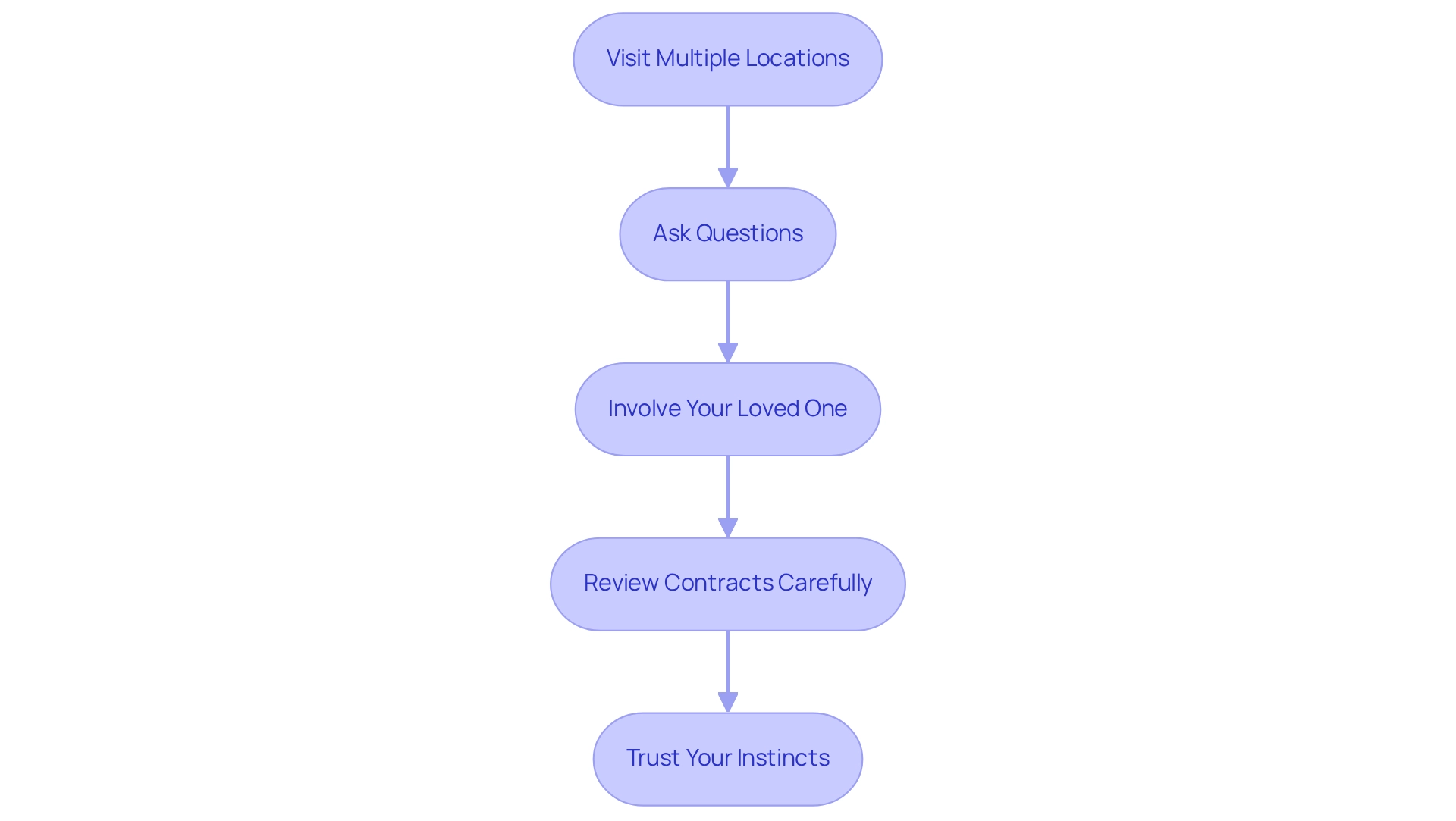
Conclusion
Personal care homes serve as a vital solution for families navigating the complexities of senior care, blending independence with essential support for daily living activities. These facilities are significant not only for their personalized care plans but also for creating a nurturing environment that prioritizes residents’ well-being. The increasing trend toward individualized care and innovative programs enhances seniors’ quality of life, making personal care homes a preferred choice for many families.
When evaluating options, it’s important to consider several critical factors, such as:
- Location
- Services
- Amenities
- Staff qualifications
Engaging with current residents and their families can provide invaluable insights into the quality of care and overall atmosphere of potential homes. Additionally, understanding the financial implications, including costs and insurance options, is crucial in making an informed decision that aligns with both care needs and budgetary constraints.
Ultimately, the journey to find the right personal care home is deeply personal. It requires careful assessment of each facility’s offerings and the unique needs of your loved ones. By following a thorough decision-making process that includes visits, questions, and consultations with professionals, families can ensure they select a living arrangement that meets logistical requirements while supporting the emotional and physical well-being of their loved ones. The commitment to providing compassionate care in personal care homes is paramount, reinforcing the message that these environments play a vital role in enhancing the lives of seniors and individuals with disabilities.
Frequently Asked Questions
What are personal care homes and their primary purpose?
Personal care homes, also known as assisted living facilities, provide a nurturing environment for individuals who need assistance with daily living activities but do not require intensive medical care. Their primary purpose is to encourage independence while ensuring safety and support for seniors and individuals with disabilities.
What types of assistance do personal care homes offer?
Personal care homes offer help with essential tasks such as bathing, dressing, medication management, and meal preparation.
How are personal care homes evolving in 2025?
In 2025, there is a growing focus on creating personalized support plans tailored to the unique needs of residents, significantly enhancing their quality of life. Many facilities are also embracing innovative programs that promote social engagement and physical activity.
What statistics reflect the popularity of personal care homes?
Over 800,000 occupants reside in personal care homes across the U.S., indicating their increasing preference among households.
What role does Best Care Nurses Registry play in personal care homes?
Best Care Nurses Registry provides domestic health assistance services, including CNA/HHA services, focusing on safety, convenience, and emotional support for seniors and their families in areas like Miami, Fort Lauderdale, and Boca Raton.
What risks do seniors face if domestic health services are neglected?
Neglecting domestic health services can lead to significant risks for seniors, including health deterioration, poor nutrition, sanitation issues, mobility challenges, social isolation, household hazards, and medication mismanagement.
How do personal care homes promote independence and dignity for residents?
Personal care homes effectively promote independence by allowing seniors to maintain dignity in their daily lives, often resulting in increased resident satisfaction and a decrease in the need for emergency medical interventions.
What factors should families consider when selecting a personal care home?
Families should consider the proximity of the facility to relatives, the quality and type of services offered, available amenities, and the importance of consulting with family and healthcare professionals for insights.
Why is the location of a personal care home important?
The location is crucial for a resident’s emotional well-being, as homes situated near loved ones can significantly enhance comfort and support.
How can families address concerns in a residential facility?
Families should tackle any problems proactively by engaging a skilled legal team if necessary, which can help address concerns of elder mistreatment and safeguard the well-being of their loved ones.

